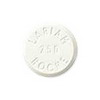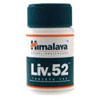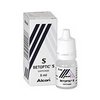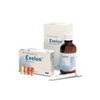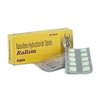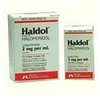INDICATIONS
Lariam (Mefloquine) is a medication to treat malaria, a disease caused by parasites. This medicine works by interfering with the growth of parasites in the red blood cells of the human body.
Parasites that cause malaria typically enter the body through the bite of a mosquito. Malaria is common in areas such as Africa, South America, and Southern Asia.
Mefloquine is used to treat or prevent malaria.
Mefloquine may also be used for other purposes not listed in this medication guide.
INSTRUCTIONS
Take this medication exactly as it was prescribed for you. Do not take the medication in larger amounts, or take it for longer than recommended by your doctor. Follow the directions on your prescription label.
It is important to use this medication regularly to best prevent malaria. If you stop using the medication early for any reason, talk to your doctor about other forms of malaria prevention.
If you have trouble swallowing the mefloquine tablet, you may crush the tablet and mix it into a small glass of milk, water, or other beverage to make swallowing easier.
If you vomit within 1 hour after taking this medication, take another half dose. If your vomiting continues, call your doctor.
If you are taking this medicine to prevent malaria:
Start taking the medicine 1 week before entering an area where malaria is common. Continue taking the medicine once weekly during your stay and for at least 4 weeks after you leave the area.
Take your weekly dose on the same day each week.
If you stop taking the medicine early for any reason, contact a healthcare professional about another form of malaria prevention.
If you are taking mefloquine to treat malaria:
Take five (5) tablets at one time, unless your doctor tells you otherwise.
Do not take mefloquine on an empty stomach.
Take the medicine with a full glass (8 ounces) of water.
In addition to taking mefloquine, use protective clothing, insect repellents, and mosquito netting around your bed to further prevent mosquito bites that could cause malaria.
To be sure this medication is not causing harmful effects, your liver function may need to be tested with blood tests on a regular basis. You may also need regular eye exams. Do not miss any visits to your doctor.
Contact your doctor as soon as possible if you have been exposed to malaria, or if you have fever or other symptoms of illness during or after a stay in an area where malaria is common.
No medication is 100% effective in treating or preventing malaria. For best results, keep using the medication as directed. Talk with your doctor if you have fever, vomiting, or diarrhea during your treatment.
DOSAGE
Adult Patients
Five tablets (1250 mg) mefloquine hydrochloride to be given as a single oral dose. The drug should not be taken on an empty stomach and should be administered with at least 8 oz (240 mL) of water.
If a full-treatment course with Lariam (mefloquine) does not lead to improvement within 48 to 72 hours, Lariam (mefloquine) should not be used for retreatment. An alternative therapy should be used. Similarly, if previous prophylaxis with mefloquine has failed, Lariam (mefloquine) should not be used for curative treatment.
Malaria Prophylaxis
The recommended prophylactic dose of Lariam (mefloquine) is approximately 5 mg/kg body weight once weekly. One 250 mg Lariam (mefloquine) tablet should be taken once weekly in pediatric patients weighing over 45 kg. In pediatric patients weighing less than 45 kg, the weekly dose decreases in proportion to body weight:
30 to 45 kg: 3/4 tablet
20 to 30 kg: 1/2 tablet
Experience with Lariam (mefloquine) in pediatric patients weighing less than 20 kg is limited.
STORAGE
Store mefloquine at room temperature away from moisture and heat.
MORE INFO:
Active ingredient: Mefloquine

